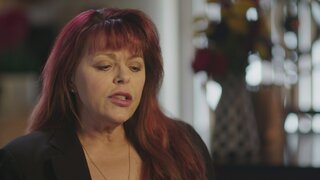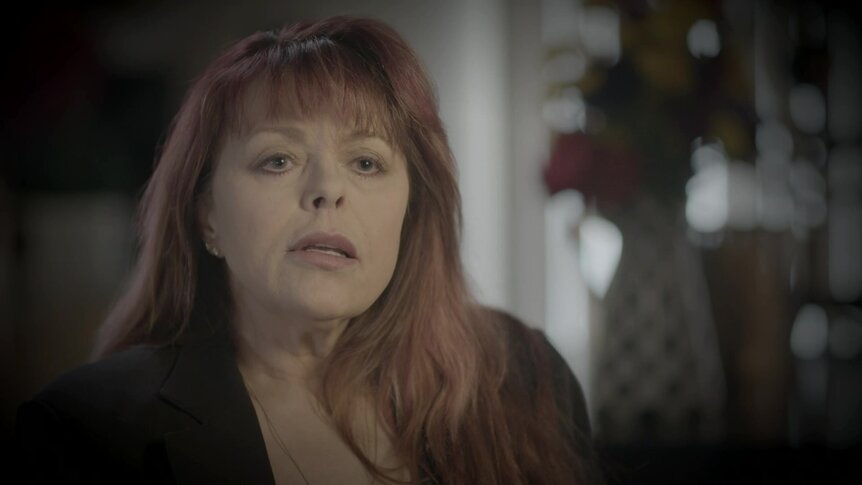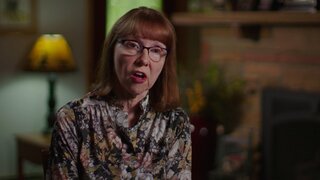Create a free profile to get unlimited access to exclusive videos, breaking news, sweepstakes, and more!
Why Did Mark Hacking Kill His Wife?
Mark Hacking had lied to everybody close to him for years — including his wife. When she got too close to the truth, however, Mark took deadly action.

On July 19, 2004, Mark Hacking called Salt Lake City police to inform them that his recently pregnant wife was missing, after she left for her early morning jog and later failed to show up to work. After a monthlong police investigation, including neighborhood searches and interviews, Hacking was arrested for her murder. His wife’s death, however, wasn’t the only thing he had been lying about.
Hacking had been lying about his entire life story. In the premiere episode of Oxygen’s new series “A Lie to Die For,” the families of Mark Hacking and his wife, Lori Soares, told Oxygen of the many lies Hacking got his family to believe. Everyone around Hacking believed that he had been accepted into a medical program at the University of North Carolina — and, naturally, that he had completed his undergraduate degree. After all, he did come from a family of brains: Hacking’s father was a pediatrician, his mother was a nurse and his brothers were successful in their respective scientific fields.
“It’s cliché to say that it started with such small lies that turned into such big lies, that ended in a murder,” Detective Taylor West told Oxygen. West was one of the Salt Lake City authorities who were active in the 2004 investigation. And “all to cover up perceptions and lies about perceptions that people had of Mark.”
Hacking and Soares were high school sweethearts, and quite happy, according to Soares’ mother, Thelma. The couple had been married for five years, and Lori was just a few weeks pregnant when her husband killed her, then concocted a story to cover up the murder. During an interview between Hacking and Kelly Kent, the lead detective when Lori’s death was still being investigated as a disappearance, Hacking claimed there were no problems in the couple’s marriage. However, when Kent searched Hacking’s house, his statement didn’t ring true.
What did Detective Kent find?
“I-screwed-up-and-you’re-mad-at-me-flowers,” Kent told Oxygen. “And in this vase are those kinds of flowers — they’re expensive flowers, huge bouquet. So, I know at that point, there is something wrong in this marriage.”
It turned out that the rift between Hacking and Lori opened on the night before she went missing. Lori had found out about Hacking’s lies, and confronted him about it in a handwritten letter. She told him she could not stay with him any longer.
“Lori was so sad when she learned his entire life was a made-up story,” retired SLC Police Public Information Officer Dwayne Baird told Oxygen. “Most people would think, just divorce and live different lives, but, in fact, he didn’t want to do that. He decided that he was going to somehow get rid of her and not have to worry about it.”
Hacking shot Lori in the head with a rifle while she was sleeping. He disposed of the body in a dumpster, and police would later find some remains in the Salt Lake City landfill. Hacking eventually confessed to his brothers that he killed his wife, and ultimately pleaded guilty to murder. NBC News reported that during his emotional testimony to Judge Denise Lindberg, Hacking was full of regret and was unable to explain why he killed his wife who did “nothing but love me [Hacking] unconditionally.”
On June 6, 2005, Hacking was found guilty and sentenced to six years to life — the maximum penalty under Utah law.
According to the Deseret News, Hacking and his family released a statement the day after his sentencing. The family expressed in the statement that, while Hacking’s crime was inexcusable, Hacking was struggling with his own set of personal mental-health issues, including a learning disability and his emotional turmoil from failing university classes. The statement also included a quote from Mark:
“There is no such thing as a harmless lie, no matter how small it is,” he wrote. “You may think a lie only hurts the liar, but this is far from the truth. If you are traveling a path of lies, please stop now and face the consequences.”
To learn more about the trail of lies Mark Hacking left behind, watch “A Lie to Die For” on Oxygen, which premiered on Sunday, June 23.



















